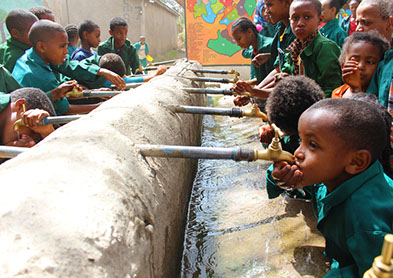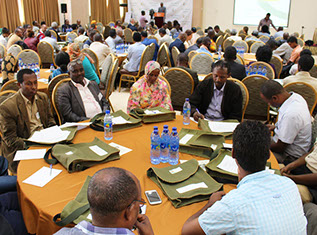Annual Update 2018 VNG International
‘We used to think that CSOs do not have a job; they just sit and eat the budget and do not contribute at all. Now we understand how they use their resources and how the society participates through them’
Tigray regional council member
‘When I closed my eyes at the beginning of the workshop, and thought about beautiful Ethiopia I could not see myself in it, because people like me do not have a place in society. At the end of this workshop I feel different, because I have sat at the same table with senior government officials. They listened to me and we shared meals together. I cannot begin to tell you what this means for someone like me, so I wrote a poem’
A visually impaired service user at an ESAP learning benchmark workshop
‘I wish I had paid for Social Accountability (SA) training rather than receiving an allowance for getting the training, because due to SA we obtained water which is life!’
SAC member
Sodo woreda SNNP region


Involving Citizens in Decision Making by strengthening local government
Featured Project
Ethiopia, Protection of Basic Services: Social Accountability Programme II (ESAPII)
> ESAPII aims to strengthen the use of social accountability (SA) tools, approaches and mechanisms by (a) citizens and citizens groups, (b) civil society organisations, (c) local government officials and (d) service providers as a means to make basic service delivery more equitable, effective, efficient, responsive and accountable. The project set up a Grant Management scheme, providing grants to Social Accountability Implementing Partners (SAIPS); developed SA tools; provided training, awareness raising activities, learning events, etc. It is financed through a World Bank (WB) managed Multi-Donor Trust Fund (MDTF). The success of the project led to first a bridging phase, then an extension of the bridging phase till 31 December 2018, and now a follow-up project from 2019.
Results include:
- In 223 woredas (districts), about 25% country coverage equally spread over the country, citizens and providers of basic services have achieved a mutual understanding about the qualitative improvement of the services in education, water & sanitation, health care, agricultural extension and rural roads;
- As a result of training in SA (with tools developed by the project), financial affairs and mediation, Ethiopian Civil Society Organizations (CSOs) now manage to play a key role in the SA process as mediator/facilitator of the dialogue between citizens and providers of the services;
- Citizens and providers identify separately the main bottlenecks in 1-2 of the five basic sectors using a set of SA tools. They come together and try to find consensus which finally results in a joint action plan that is implemented. In each of the 223 districts such a plan has been developed and implemented;
- The SA process, with its structural exchange between the local governments, service providers and citizens, has created mutual trust, more than most people had ever considered possible. This is a solid basis for achieving structural results;
- The Social Accountability Committee (SAC) is a platform consisting of citizen members and local government representatives who together monitor the SA process at local level. Several woredas continue the SA process without further project support; others have extended the SA approach to other sectors, not covered by ESAP II;
- The project has been successful in ensuring the involvement of vulnerable groups (elderly, women, youth, disabled people and people with HIV/Aids) in every step of the SA process, making the SA process really inclusive.